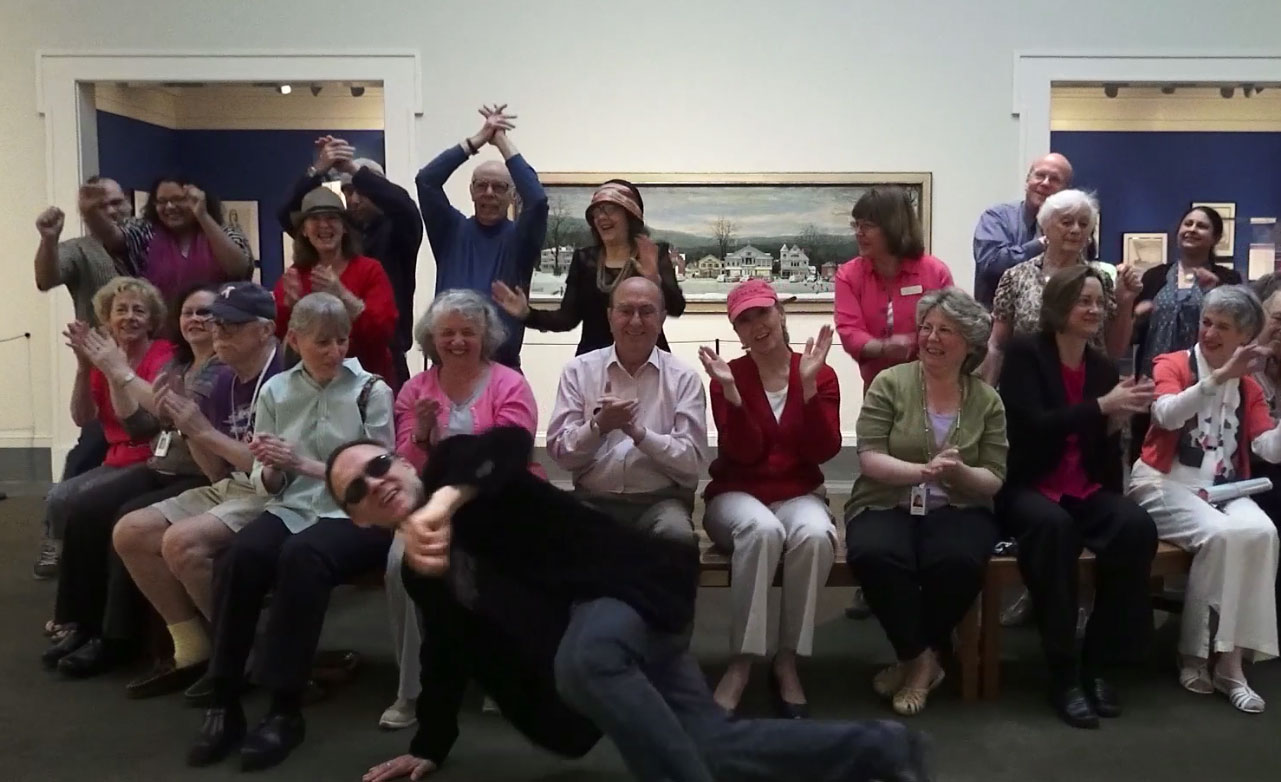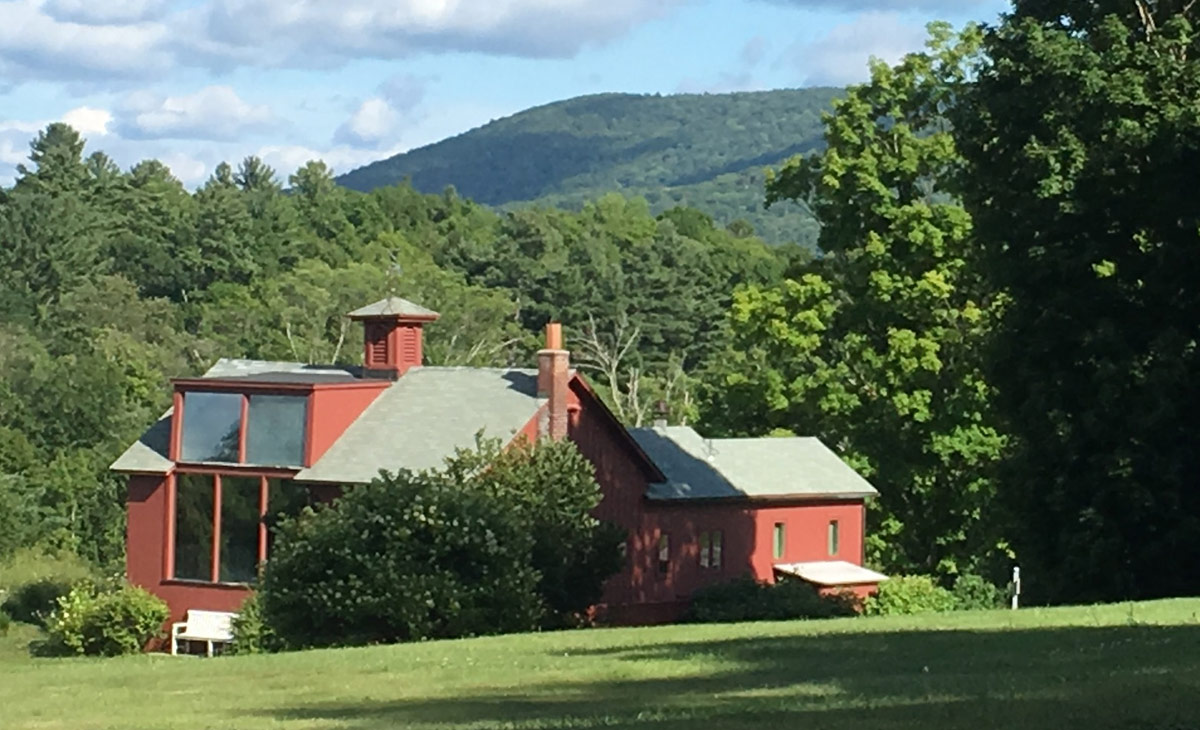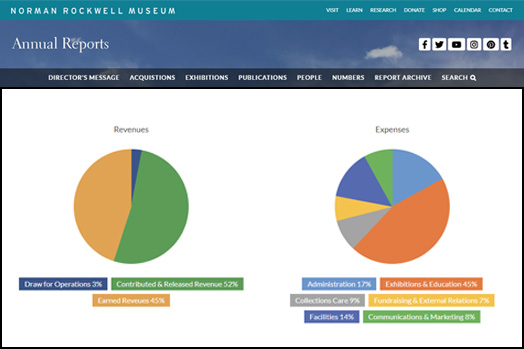ABOUT THE MUSEUM
OUR MISSION

The Norman Rockwell Museum illuminates the power of American illustration art to reflect and shape society, and advances the enduring values of kindness, respect, and social equity portrayed by Norman Rockwell.
Land Acknowledgement
It is with gratitude and humility that we acknowledge that we are learning, speaking and gathering on the ancestral homelands of the Mohican people, who are the indigenous peoples of this land on which the Norman Rockwell Museum was built. Despite tremendous hardship in being forced from here, today their community resides in Wisconsin and is known as the Stockbridge-Munsee Community. We pay honor and respect to their ancestors past and present as we commit to building a more inclusive and equitable space for all.
MUSEUM HISTORY
Founded in 1969 with the help of Norman and Molly Rockwell, Norman Rockwell Museum is dedicated to the enjoyment and study of Rockwell’s work and his contributions to society, popular culture, and social commentary. The Museum, which is accredited by the American Association of Museums, is the most popular year-round cultural attraction in the Berkshires.
The Museum houses the world’s largest and most significant collection of Rockwell’s work, including 998 original paintings and drawings. Rockwell lived in Stockbridge for the last 25 years of his life. Rockwell’s Stockbridge studio, moved to the Museum site, is open to the public from May through October, and features original art materials, his library, furnishings, and personal items. The Museum also houses the Norman Rockwell Archives, a collection of more than 100,000 items, including working photographs, letters, personal calendars, fan mail, and business documents.
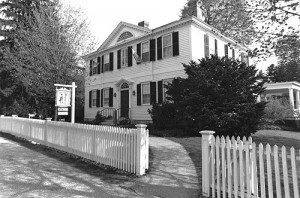
Having spent its first 24 years at the Old Corner House on Stockbridge’s Main Street, the Museum moved to its present location, a 36-acre site overlooking the Housatonic River Valley, in 1993. Internationally renowned architect Robert A. M. Stern designed the Museum gallery building.
One of the great charms of the Museum is its location. Many of Rockwell’s world-renowned images were drawn from the surrounding community and its residents. “The Norman Rockwell Museum in Stockbridge, Massachusetts, must be one of the most popular museums in the world,” wrote author Paul Johnson, “crammed from dawn till dusk with delighted visitors crowding round the originals of much-loved paintings. And one of the further pleasures of this enchanting place is that in the nearby little towns you can recognize among the locals the children and grandchildren of those whom Rockwell painted with dedicated veracity.”
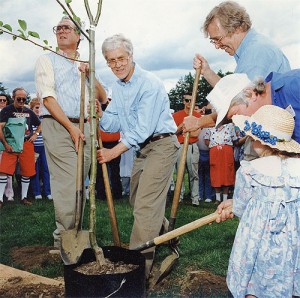
CURRENT EXHIBITIONS
NORMAN ROCKWELL’S STUDIO
Rockwell occupied some 20 studios during his life, but it was the last one—seen below—that he called his “best studio yet.” The building was originally located in the backyard of his home on South Street in Stockbridge, Mass. In 1976, toward the end of his life, Rockwell left the studio and its contents to Norman Rockwell Museum. The building was cut in two and moved to the Museum’s grounds in 1986.
The Museum has long presented the studio as it was when Rockwell passed away. Now, we have turned back the clock to an earlier, active period in his career: October 1960, when he was hard at work on his painting, Golden Rule, which would later appear on the cover of the Saturday Evening Post. Enjoy this special glimpse into Rockwell’s surroundings, working process, and sources of artistic inspiration…just as they were in 1960!
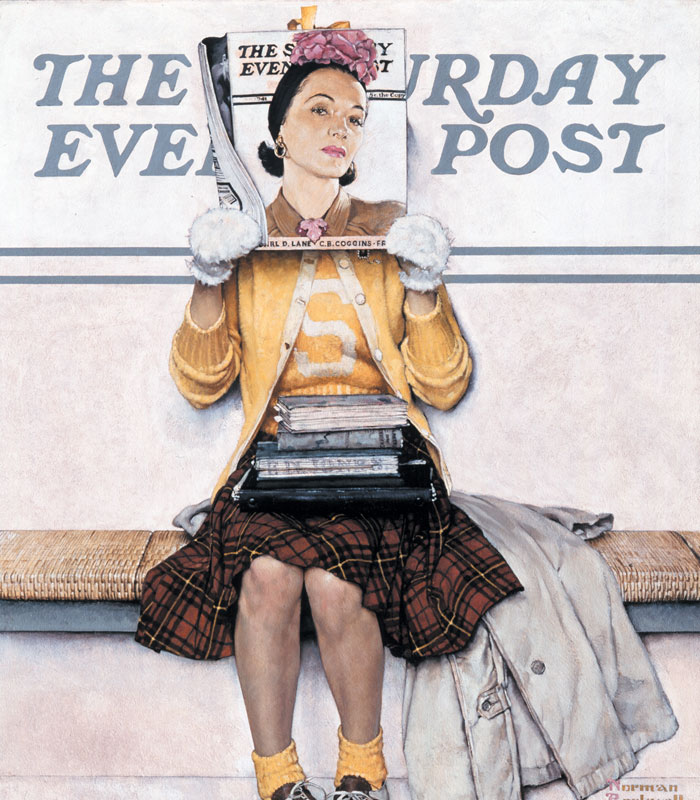
Norman Rockwell (1894-1978), Girl Reading the Post, 1941. Cover illustration for The Saturday Evening Post, March 1, 1941. From the collection of Norman Rockwell Museum. © 1941 SEPS: Curtis Licensing, Indianapolis, IN. All rights reserved.
NORMAN ROCKWELL’S
323 SATURDAY EVENING POST COVERS
For nearly 50 years, millions of Americans brought Norman Rockwell’s art into their homes, enjoying the artist’s Saturday Evening Post covers while seated in their favorite chairs, surrounded by their belongings in the company of their families. This intimate connection with Rockwell’s art made his images a part of the fabric of American lives. This comprehensive exhibition of original Saturday Evening Post cover tear sheets features each of Norman Rockwell’s illustrations for the publication, created between 1916 and 1963.
MAIN STREET STOCKBRIDGE AT CHRISTMAS
Rockwell’s 1967 painting, Main Street Stockbridge at Christmas (Home for Christmas) has come to represent the epitome of the “quintessential New England town.”
Stockbridge Mainstreet at Christmas (Home for Christmas) (detail), Norman Rockwell. 1967. Oil on canvas, 26 ½ x 95 ½”. Story illustration for McCall’s, December 1967. Norman Rockwell Museum Collection. ©Norman Rockwell Family Agency. All rights reserved.
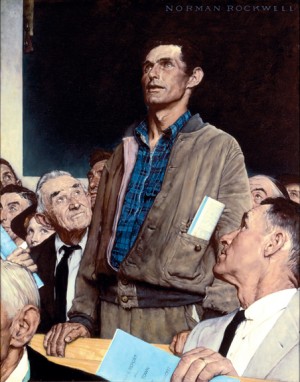
Norman Rockwell (1894-1978), Freedom of Speech, 1943. Illustration for The Saturday Evening Post, February 20, 1943. From the collection of Norman Rockwell Museum. © 1943 SEPS: Licensed by Curtis Licensing, Indianapolis, IN. All rights reserved.
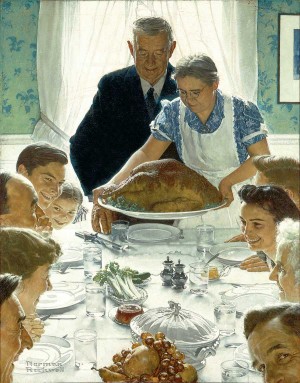
Norman Rockwell (1894-1978), Freedom From Want, 1943. Illustration for The Saturday Evening Post, March, 6, 1943. From the collection of Norman Rockwell Museum. © 1943 SEPS: Licensed by Curtis Licensing, Indianapolis, IN. All rights reserved.
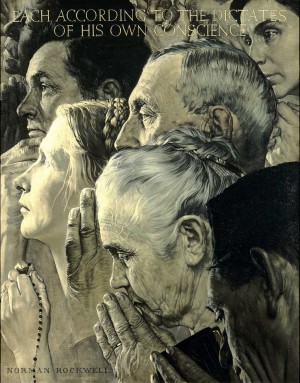
Norman Rockwell (1894-1978), Freedom of Workship, 1943. Illustration for The Saturday Evening Post, February 27, 1943. From the collection of Norman Rockwell Museum. © 1943 SEPS: Licensed by Curtis Licensing, Indianapolis, IN. All rights reserved.
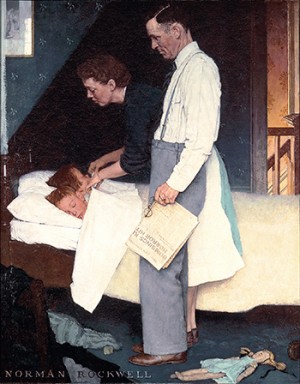
Norman Rockwell (1894-1978), Freedom From Fear, 1943. Illustration for The Saturday Evening Post, March, 13, 1943. From the collection of Norman Rockwell Museum. © 1943 SEPS: Licensed by Curtis Licensing, Indianapolis, IN. All rights reserved.
THE FOUR FREEDOMS
In his January 1941 address to Congress, President Franklin Delano Roosevelt articulated his vision for a postwar world founded on four basic human freedoms: freedom of speech, freedom of religion, freedom from want, and freedom from fear. In the spring of 1942, Norman Rockwell was working on a piece commissioned by the Ordnance Department of the U.S. Army, a painting of a machine gunner in need of ammunition. Posters of the gunner, titled Let’s Give Him Enough and On Time, were distributed to ordnance plants throughout the country to encourage production. But Rockwell wanted to do more for the war effort and decided he would illustrate Roosevelt’s four freedoms. While mulling it over, Rockwell, by chance, attended a town meeting where one man rose among his neighbors and voiced an unpopular view. That night Rockwell awoke with the realization that he could paint the freedoms best from the perspective of his own hometown experiences using everyday, simple scenes such as his own town meeting.
The paintings were a phenomenal success. After their publication, the Post received 25,000 requests for reprints. In May 1943, representatives from the Post and the U.S. Department of the Treasury announced a joint campaign to sell war bonds and stamps. They would send the Four Freedomspaintings along with 1,000 original cartoons and paintings by other illustrators and original manuscripts from The Saturday Evening Post on a national tour.
Traveling to sixteen cities, the exhibition was visited by more than a million people who purchased 133 million dollars in war bonds and stamps. Bonds were sold in denominations of $25, $100, and $1,000, and each person who purchased one received a set of prints of the four paintings.
ARCHIVES
The Norman Rockwell Archive contains more than 100,000 photographs, letters, and other rare mementos.
A visit to the Museum is an uplifting experience. Founded in 1969 with the help of Norman and Molly Rockwell, the Museum is dedicated to the enjoyment and study of the work of America’s favorite artist. The Museum’s changing Norman Rockwell exhibitions present an illustrated chronicle of American life and showcase our nation’s ideals of kindness, tolerance, democracy, and freedom, as interpreted through the artist’s spirit, wisdom, and gentle humor.
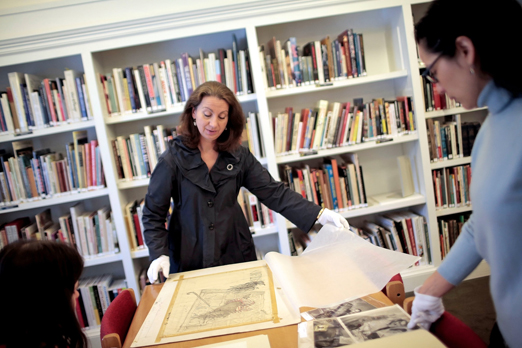
ANNUAL REPORT
The Annual Report for Norman Rockwell Museum Fiscal Year 2019
A visit to the Museum is an uplifting experience. Founded in 1969 with the help of Norman and Molly Rockwell, the Museum is dedicated to the enjoyment and study of the work of America’s favorite artist.
This Annual Report summarizes the strides that Norman Rockwell Museum has taken in the Fiscal Year 2019. Read a message from the Director, FY 2019 aquisitions, exhibitions, publications, people, measures of success, and the Annual Report archive.
MUSEUM LEADERSHIP
DIRECTOR
Laurie Norton Moffatt……Director/CEO
BOARD OF TRUSTEES
Board of Trustees 2024-2025
September 20, 2024
OFFICERS (names are repeated in list below):
Dolf Berle, Chair & President
Mary K. Grant, PhD, Vice Chair & 1st Vice President
Peter C. Williams, 2nd Vice President
Roberta McCulloch-Dews, 3rd Vice President
Tom Ruffing, Treasurer
Jill Hai, Clerk
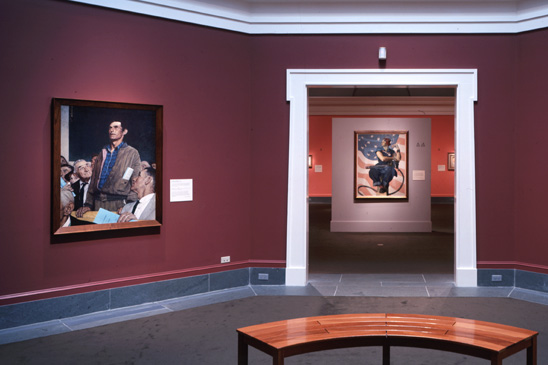
MUSEUM STAFF
Main Phone: 413-298-4100
| Name/Dept. | Phone Number | |
| General Information | ||
| Visitor Services | 413-931-2221 | |
| Museum Store | 800-742-9450 | |
